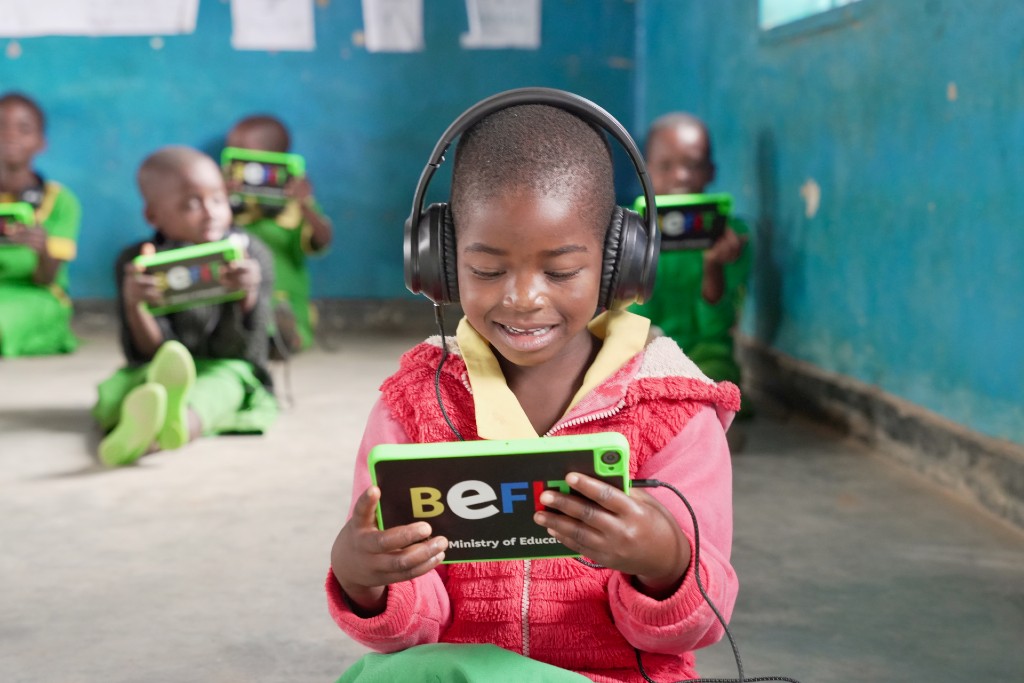I recently returned from a truly inspiring trip to Malawi — the small African nation that we have had the honor of working with over the past several years. Malawi is poised to redefine the education landscape not only for its own country but potentially for countries across the globe. Picture this: one of the lowest-income nations, with an average age of 17, is on the brink of becoming one of the first to scale education technology to every primary school student. Yes, you read that correctly — every primary school student. Also, it’s not just any technology, onebillions’s world-class software that the schools are introducing has been rigorously tested and proven to significantly increase learning outcomes.
The scope of this endeavor is nothing short of monumental. Malawi is committed to tackling the country’s learning poverty (estimated to be almost 90%) head-on by scaling education technology to all 3.8 million learners annually, spanning all 6000 primary schools through its BEFIT program. What sets this initiative apart is its inclusivity. It encompasses every school, both rural and urban, ensuring universal access for all children to reading and basic math skills. The launch of the first 500 schools this year, executed on time and within budget, has ignited waves of excitement across the nation.
This palpable enthusiasm transcends demographic boundaries — it resonates among students, parents, teachers, and government officials alike. The term echoing through communities is “game-changer.” Beyond enhancing foundational learning — the bedrock of a child’s ability to thrive — this initiative has triggered a surge in school enrollment and attendance. Children are now more eager to attend school and parents witness a higher return on their investment in their children’s education.
The impact isn’t confined to the realm of education alone. Additional benefits are already materializing — solar power is being introduced in every school, often marking the first instance of renewable energy in the community. Digital training for teachers is becoming ubiquitous, and jobs are being created to install and maintain the technical equipment. There are also exciting opportunities to collaborate with existing literacy and numeracy programs like the National Numeracy Program and National Reading Program, to collectively boost children’s academic achievement.
What’s particularly noteworthy is that sustainability is embedded in this transformative journey from day one. Crucially, this is the government of Malawi’s program, with temporary support from Imagine Worldwide and other partners. What distinguishes this initiative is the government’s unequivocal ownership of its success. Leveraging the existing educational system, various ministries (including Education, Energy, Finance, and Local Government) are actively contributing to the initiative. The commitment extends beyond the initial infrastructure phase, funded by private philanthropy and aid, with the government agreeing to cover all recurring costs, estimated to be less than $5 per child per year.
Several converging factors have made this extraordinary initiative possible. The bold commitment of the Malawian government to reduce learning poverty, supported by robust evidence from numerous Randomized Controlled Trials (RCTs), the generous donation of learning software by onebillion, and $20 million in catalytic funding from JBJ Capital, UBS Optimus, Founders Pledge, Rippleworks, and others have been instrumental. Additionally, the efficient coordination of the ecosystem by Imagine LTD, our local NGO run by a dedicated team of Malawians, has played a pivotal role.
And this is just the beginning. Insights from the first phase will shape Phase 2 of the program (academic year 2024/2025), encompassing an additional 1000 schools and serving over 800,000 students. Access is expanding, costs are decreasing, and efficacy will continue to increase.
It is a profound privilege to be part of this incredible program — one that will impact millions of children in Malawi and establish a roadmap for other nations to follow. The journey has just begun, and the potential for positive change is boundless.
Please reach out to me if you want to hear more – joe.wolf@imagineworldwide.org
(Photo Credit: onebillion)
